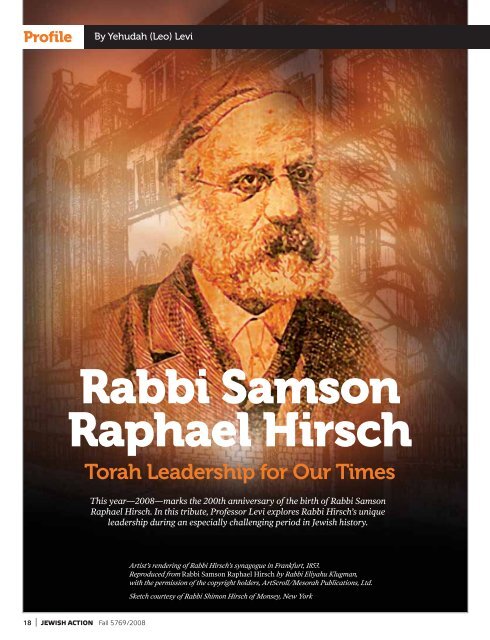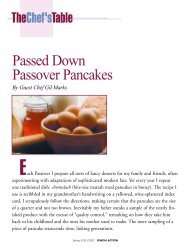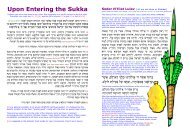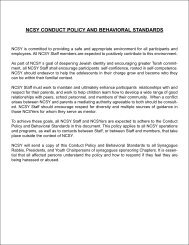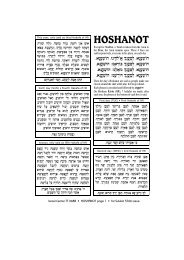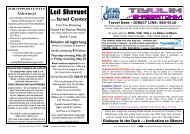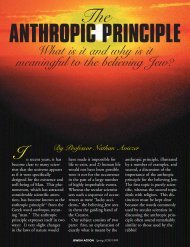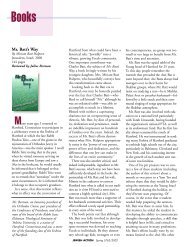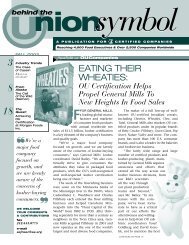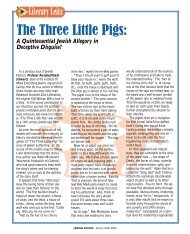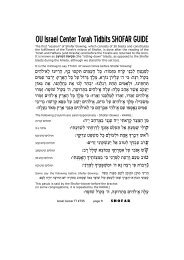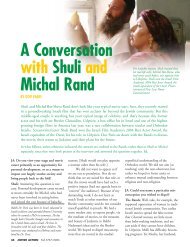Rabbi Samson Raphael Hirsch - Orthodox Union
Rabbi Samson Raphael Hirsch - Orthodox Union
Rabbi Samson Raphael Hirsch - Orthodox Union
Create successful ePaper yourself
Turn your PDF publications into a flip-book with our unique Google optimized e-Paper software.
Profile<br />
By Yehudah (Leo) Levi<br />
<strong>Rabbi</strong> <strong>Samson</strong><br />
<strong>Raphael</strong> <strong>Hirsch</strong><br />
Torah Leadership for Our Times<br />
This year—2008—marks the 200th anniversary of the birth of <strong>Rabbi</strong> <strong>Samson</strong><br />
<strong>Raphael</strong> <strong>Hirsch</strong>. In this tribute, Professor Levi explores <strong>Rabbi</strong> <strong>Hirsch</strong>’s unique<br />
leadership during an especially challenging period in Jewish history.<br />
Artist’s rendering of <strong>Rabbi</strong> <strong>Hirsch</strong>’s synagogue in Frankfurt, 1853.<br />
Reproduced from <strong>Rabbi</strong> <strong>Samson</strong> <strong>Raphael</strong> <strong>Hirsch</strong> by <strong>Rabbi</strong> Eliyahu Klugman,<br />
with the permission of the copyright holders, ArtScroll/Mesorah Publications, Ltd.<br />
Sketch courtesy of <strong>Rabbi</strong> Shimon <strong>Hirsch</strong> of Monsey, New York<br />
18 I JEWISH ACTION Fall 5769/2008
The reader may be amazed to find the term “our times” applied to a personality born two centuries ago. However,<br />
today’s Torah leadership is indeed facing almost exactly the same challenges that confronted Western European Jewry 200<br />
years ago. Until then, Jews had essentially lived in ghettos; hence they were ill prepared to face the real world. The crumbling<br />
of the ghetto walls confronted the Torah leadership with two options—to attempt to create a “virtual” wall or to beef<br />
up the stunted “immune system.” Many adopted the first approach. On the other hand, there were those who saw the removal<br />
of the ghetto as a God-given opportunity to restore Jewish life to its original vigor. Among these, <strong>Rabbi</strong> <strong>Samson</strong><br />
<strong>Raphael</strong> <strong>Hirsch</strong> was probably the most creative and successful. He reminded the Jewish public of their real purpose in life.<br />
Unfortunately, the intense efforts made by some in the Torah world to insulate themselves caused many to forget the<br />
centrality of this-worldliness in the Torah. In the opening section of the Midrash Rabbah, our Sages tell us that the Torah<br />
served as the blueprint for the world—that the Torah and this world are components of one system. Adam was, after all,<br />
put into the Garden of Eden “to work it and guard it” (Genesis 2:15). When he worked the land, “thereby the purpose of<br />
creation was attained” (Ha’amek Davar, Genesis 2:4). Finally, “Not study, but rather action is the main object of [Torah]”<br />
(Pirkei Avot 1:17).<br />
im Derech<br />
Eretz” (Torah Combined<br />
with Worldly<br />
Endeavor) is the<br />
"Torah<br />
motto usually associated<br />
with <strong>Rabbi</strong> <strong>Hirsch</strong>, but it is, in<br />
reality, a fundamental Torah concept.<br />
<strong>Rabbi</strong> <strong>Hirsch</strong> only reawakened the<br />
Jewish public to its importance.<br />
While <strong>Rabbi</strong> <strong>Hirsch</strong> was universally<br />
admired throughout the Torah<br />
world, there were those who claimed<br />
that his approach was meant to be followed<br />
only in the era in which he lived<br />
due to the unique circumstances of his<br />
time. But <strong>Rabbi</strong> <strong>Hirsch</strong>’s own writings<br />
on the subject make such claims untenable.<br />
(See, for example, his “standard”<br />
biography 1 and <strong>Rabbi</strong> Yechiel<br />
Weinberg’s responsa Seridei Eish<br />
[4:368-9].) Here is one representative<br />
quote from <strong>Rabbi</strong> <strong>Hirsch</strong>’s writings:<br />
It would be most perverse and<br />
criminal of us to seek to instill in our<br />
children a contempt, based on ignorance<br />
and untruth, for everything that is<br />
not specifically Jewish, for all other<br />
human arts and sciences, in the belief<br />
that by inculcating our children with<br />
such a negative attitude we could safeguard<br />
them from contacts with the<br />
Professor Levi is past rector and professor<br />
of electro-optics at the Jerusalem Coll ege<br />
of Technology, where he also gave courses<br />
in Torah thought. In addition to 150-odd<br />
articles published in scientific, technical<br />
and Judaica journals, Professor Levi has<br />
published a number of books in optics, halachah<br />
and Jewish ideology.<br />
scholarly and scientific endeavors of<br />
the rest of mankind …You will then see<br />
that your simple-minded calculations<br />
were just as criminal as they were perverse.<br />
Criminal, because they enlisted<br />
the help of untruth supposedly in order<br />
to protect the truth, and because you<br />
have thus departed from the path upon<br />
which your own Sages have preceded<br />
you and beckoned you to follow them.<br />
Perverse, because by so doing you have<br />
achieved precisely the opposite of what<br />
you wanted to accomplish…Your child<br />
will consequently begin to doubt all of<br />
Judaism which (so, at least, it must<br />
seem to him from your behavior) can<br />
exist only in the night and darkness of<br />
ignorance and which must close its eyes<br />
and the minds of its adherents to the<br />
light of all knowledge if it is not to perish<br />
(Collected Writings 7: 415-6).<br />
By calling the contempt for all<br />
science “criminal,” <strong>Rabbi</strong> <strong>Hirsch</strong><br />
clearly shows how important science<br />
is to Torah. Even <strong>Rabbi</strong> Shimon<br />
Schwab, who as a young student in<br />
Lithuanian yeshivot was convinced<br />
that <strong>Rabbi</strong> <strong>Hirsch</strong> considered the<br />
Torah im Derech Eretz principle a compromise,<br />
eventually came to realize<br />
that the approach was, in fact, an<br />
ideal. 2 He once told me that, as a<br />
young man, he thought the Sages<br />
frowned upon secular knowledge, but<br />
later realized that they endorsed it.<br />
Coexistence, Symbiosis<br />
or Synthesis?<br />
Just how does Torah im Derech Eretz<br />
view Torah and worldly science? Are<br />
they seen as being in a state of synthesis,<br />
where each complements the<br />
other? Or in symbiosis, where each is<br />
distinct but beneficial to the other’s<br />
existence? Or in mere coexistence,<br />
with neither having any special relationship<br />
to the other? Once we have<br />
grasped the fundamental meaning of<br />
Torah im Derech Eretz, the answer is<br />
self-evident. If Torah and this world<br />
are components of a single system,<br />
their correct synthesis is the very<br />
essence of Torah life. Both must be<br />
studied before we are able to translate<br />
the Torah’s instructions into reality.<br />
<strong>Rabbi</strong> <strong>Hirsch</strong> makes it clear that<br />
this is his position. Whenever he discusses<br />
secular studies, in Horeb as<br />
well as in his commentary to the<br />
Torah, 3 he stresses that such studies<br />
must be undertaken from the viewpoint<br />
of Torah. They must serve<br />
Torah goals and must be tested by<br />
comparison with Torah principles. In<br />
the words of <strong>Rabbi</strong> <strong>Hirsch</strong>’s greatgrandson:<br />
“Torah im Derech Eretz is<br />
not to be compared to a physical mixture<br />
of two separate components, but<br />
rather to a chemical compound.” 4<br />
<strong>Rabbi</strong> <strong>Hirsch</strong> never tired of pointing<br />
out that the study of science and<br />
history is necessary for a deeper understanding<br />
of the ways of God and<br />
the Torah’s message. 5 His Commentary<br />
on the Torah is interspersed with references<br />
to scientific and historical<br />
facts to aid in the interpretation of<br />
Scripture. Here he adhered to the<br />
principle of accepting the truth from<br />
whomever presents it. (This in con-<br />
Fall 5769/2008 JEWISH ACTION I 19
trast to the humanities, where there<br />
are no human-based means to test for<br />
truth.) In one annual report of the<br />
high school he founded (perhaps the<br />
first yeshivah high school in history),<br />
he demonstrates in considerable detail—including<br />
tens of examples—<br />
how the study of natural science and<br />
world history contributes to the student’s<br />
understanding of the Torah and<br />
its message. 6 In the previous year’s report,<br />
he discussed the impact that<br />
Torah study has on our understanding<br />
of general secular concepts: “These<br />
two elements [general and special<br />
Jewish education] are in truth nothing<br />
but the two complementary and<br />
closely related parts of a complete<br />
and homogeneous education.” 7<br />
Unadulterated Judaism<br />
Jewish thinkers throughout our history<br />
have attempted to synthesize the<br />
ideas of Gentile philosophers with<br />
Lithograph by E. Schier, 1847. Courtesy of<br />
Agudath Israel of America Archives<br />
Jewish thought. Often this was accomplished<br />
by bending Torah ideas a bit or<br />
by inserting foreign elements into<br />
them, as long as it didn’t result in an<br />
obvious contradiction to Torah. In contrast<br />
to these approaches, <strong>Rabbi</strong> <strong>Hirsch</strong><br />
demands that Judaism be understood<br />
“from within itself.” 8 This demand is a<br />
central theme in his writing, and he<br />
does not hesitate to criticize those who<br />
fail to follow it, however great they<br />
may be as halachic authorities. 9<br />
In his steadfast adherence to this<br />
principle, <strong>Rabbi</strong> <strong>Hirsch</strong> never turns to<br />
outside sources for ideological inspiration.<br />
He encourages the study, from<br />
Gentile sources, of nature, psychology,<br />
anthropology and history, but not<br />
the study of humanities, which deals<br />
with the meaning of the world and<br />
man in it, and with his aspirations,<br />
values, goals and ideas. 10 Even when,<br />
on one occasion, dictates of good<br />
manners compelled him to eulogize a<br />
Gentile poet, he praised that poet for<br />
having absorbed many lofty Jewish<br />
teachings, and for having enriched the<br />
Gentile world by clothing those<br />
teachings in an inspiring form.<br />
Nowhere, however, in an address of<br />
fourteen pages, did he imply that we,<br />
as Jews, should—or need to—absorb<br />
ideas from the Gentile. 11<br />
Did <strong>Rabbi</strong> <strong>Hirsch</strong> himself absorb<br />
such ideas? In view of the above, that<br />
would seem surprising. I, for one,<br />
have not found a single foreign idea in<br />
<strong>Rabbi</strong> <strong>Hirsch</strong>’s writings. Granted,<br />
Gentile thinkers often independently<br />
rediscover certain of the Torah’s<br />
truths, and these ideas are then found<br />
in non-Jewish literature. However,<br />
when a Torah authority employs one<br />
of these concepts in his writings, it is<br />
surely poor scholarship to claim that<br />
he took it from the Gentile source<br />
when the Jewish one was there all<br />
along. The sad fact is, though, that in<br />
a generation like ours, a generation<br />
that has originated anti-hero worship<br />
and turned the dwarfing of spiritual<br />
giants into a popular sport, the requirements<br />
of good scholarship will<br />
inevitably fall victim to the desire for<br />
sensationalism. Thus it is that some<br />
scholars feign to discover foreign influences<br />
in the works of even such a<br />
purist as <strong>Rabbi</strong> <strong>Hirsch</strong>, despite the<br />
fact that the Jewish sources he draws<br />
upon are quite obvious. 12<br />
Others have not hesitated to accuse<br />
<strong>Rabbi</strong> <strong>Hirsch</strong> of being a believer<br />
in secular humanism, of adoring<br />
Western European culture and of trying<br />
to adopt two cultures that he himself<br />
was unable to reconcile. These<br />
totally unsupported claims fly in the<br />
face of <strong>Rabbi</strong> <strong>Hirsch</strong>’s repeated assertion<br />
(an assertion which he acted<br />
upon consistently) that every aspect<br />
of secular culture could be measured<br />
against the criteria of Torah before it<br />
may be accepted into our thoughtworld<br />
as true. 13 The essence of secular<br />
humanism is the belief that man is<br />
self-sufficient, that on his own he will<br />
inexorably ascend the ladder to perfection.<br />
This should be contrasted<br />
with, for example, <strong>Rabbi</strong> <strong>Hirsch</strong>’s<br />
comment that even scientific knowledge<br />
is dependent on belief in God’s<br />
creation for its validation 14 —that even<br />
modern scientific progress was not<br />
possible until the Jewish people<br />
spread the knowledge of God’s unity<br />
among the nations. 15<br />
<strong>Rabbi</strong> <strong>Hirsch</strong> lived in a time of<br />
great upheaval, when Jews were being<br />
granted progressively greater rights.<br />
It was easy to become intoxicated<br />
with the feeling of freedom, and such<br />
indeed was the spirit of the time.<br />
Reading <strong>Rabbi</strong> <strong>Hirsch</strong>’s works, one is<br />
impressed by the low-key terms in<br />
which he refers to the emancipation.<br />
Far from being swept up in the fervor,<br />
<strong>Rabbi</strong> <strong>Hirsch</strong> repeatedly warns his<br />
fellow Jews not to be deceived by the<br />
unprecedented liberality they were<br />
experiencing. Renewed anti-Semitism<br />
could well be lurking around the corner.<br />
“Who knows?” he wrote. “Perhaps<br />
it is just those who are blinded<br />
by their exaggerated vision, idolizing<br />
emancipation and equality, who will<br />
be the cause of reviving the danger of<br />
renewed enslavement [of the Jews].” 16<br />
With almost prophetic insight<br />
he writes:<br />
Perhaps the day will come when all<br />
the things bestowed upon mankind for<br />
its benefit and liberation will become<br />
corrupted into their very antithesis.<br />
Mankind, instead of assuring its members<br />
their legitimate rights of development<br />
... will serve them the<br />
tear-drenched bread of slaves and the<br />
worm-wood of bitterness.... At such time,<br />
science, too, will become solely destructive<br />
... will frantically blind itself with its<br />
own brightness .... Mankind will vainly<br />
exhaust its strength in a blind upsurge of<br />
uncurbed desires .... 17<br />
In addition to their amazing timeliness,<br />
these clear, unequivocal statements<br />
give lie to the above claim that<br />
<strong>Rabbi</strong> <strong>Hirsch</strong> favored Gentile philosophies,<br />
in general, and secular humanism,<br />
in particular.<br />
Jewish Nationalism and<br />
Eretz Yisrael<br />
<strong>Rabbi</strong> <strong>Hirsch</strong> views Judaism as primarily<br />
nationalistic in nature, not “religious”<br />
per se. He stresses that Jewry<br />
is a people and not merely a religious<br />
20 I JEWISH ACTION Fall 5769/2008
community. In his Commentary on the<br />
Torah, he demonstrates this contention<br />
clearly and ascribes any effort<br />
to classify Judaism as a religion to<br />
“thoughtlessness.” 18 He defines Torah<br />
literature as “Jewish national literature”<br />
and Torah education as “Jewish<br />
national education.” 19 Concerning the<br />
exile, while not denying the positive<br />
contribution the Talmud assigns to<br />
it, 20 <strong>Rabbi</strong> <strong>Hirsch</strong> declares: “As long as<br />
the Jewish national organism is in<br />
exile, it is sick.” 21 No wonder the author<br />
of Seridei Eish writes that <strong>Rabbi</strong><br />
<strong>Hirsch</strong> “must be deemed a wholehearted<br />
extreme nationalist.” 22<br />
Concerning the central role<br />
played by Eretz Yisrael in Torah<br />
thought, <strong>Rabbi</strong> <strong>Hirsch</strong> is just as explicit.<br />
He writes that whereas the<br />
Torah is meant to accompany us<br />
wherever we must wander, a full Jewish<br />
life—materially and spiritually<br />
full—is limited to Eretz Yisrael, and<br />
Are Torah and worldly science seen as being in a state<br />
of synthesis, where each complements the other? Or<br />
in symbiosis, where each is distinct but beneficial to<br />
the other’s existence? Or in mere coexistence, with<br />
neither having any special relationship to the other?<br />
that God Himself established an especially<br />
tight bond between the people<br />
and the Land of Israel. 23 Indeed, when<br />
discussing Eretz Yisrael, his comments<br />
uncharacteristically border on<br />
the mystical. He points out that before<br />
Abraham went to Eretz Yisrael,<br />
God merely spoke to him; only in<br />
Eretz Yisrael did God appear to him. 24<br />
Developing the idea, <strong>Rabbi</strong> <strong>Hirsch</strong> explains<br />
that when God wanted to rejuvenate<br />
mankind and return His<br />
presence to earth, He chose a land<br />
that was suitable for that purpose,<br />
one that would enable those who live<br />
on it according to God’s will to reach<br />
the highest levels of spirit and morality.<br />
That land is Eretz Yisrael. Elsewhere<br />
he suggests that because Eretz<br />
Yisrael was spared the ravages of the<br />
Deluge, it retained the pristine quality<br />
of the earth. 25<br />
<strong>Rabbi</strong> <strong>Hirsch</strong> expressed his love<br />
for Eretz Yisrael not only in word but<br />
also in deed. He warmly supported<br />
the nineteenth-century efforts to develop<br />
self-supporting agricultural settlements<br />
in Eretz Yisrael; he raised<br />
money for them, 26 and in 1883 issued<br />
an urgent appeal to support the pioneering<br />
community of Petach Tikva. 27<br />
In view of all this, how can we<br />
explain occasional claims that <strong>Rabbi</strong><br />
<strong>Hirsch</strong> was an anti-nationalist? These<br />
claims seem to be based on two facts:<br />
<strong>Rabbi</strong> <strong>Hirsch</strong>, with all the importance<br />
he attached to Jewish nationalism, always<br />
emphasized that only Torah imbued<br />
it with significance. A second<br />
source of misunderstanding on this<br />
score was his refusal to assist <strong>Rabbi</strong><br />
Tzvi <strong>Hirsch</strong> Kalischer with his efforts<br />
to resettle Eretz Yisrael. <strong>Rabbi</strong> Kalischer<br />
worked within the framework of<br />
Fall 5769/2008 JEWISH ACTION I 21
Far from being swept up<br />
in the fervor, <strong>Rabbi</strong><br />
<strong>Hirsch</strong> repeatedly warns<br />
his fellow Jews not to be<br />
deceived by the unprecedented<br />
liberality they<br />
were experiencing.<br />
Photo courtesy of <strong>Rabbi</strong> Shimon <strong>Hirsch</strong><br />
Chovevei Tzion, which advocated establishing<br />
a Jewish homeland in Eretz<br />
Yisrael. <strong>Rabbi</strong> <strong>Hirsch</strong> refused to cooperate<br />
because he saw these endeavors<br />
as violating “the three oaths,” 28 which<br />
prohibit all effort to end the exile by<br />
force as well as to rebel against “the<br />
nations.” According to the Talmud,<br />
these prohibitions would remain in<br />
effect as long as the nations of the<br />
world opposed such settlement.<br />
<strong>Rabbi</strong> <strong>Hirsch</strong> did not regard the<br />
political efforts of the fledgling<br />
Zionist movement as voiding the<br />
Torah’s restrictions. 29<br />
What, we may well ask, would<br />
have been <strong>Rabbi</strong> <strong>Hirsch</strong>’s attitude toward<br />
the present State of Israel? Answering<br />
such a hypothetical question<br />
is always speculative. Let us first see<br />
how the last century’s Torah authorities<br />
viewed the historical developments<br />
they witnessed. <strong>Rabbi</strong> Meir<br />
Simcha of Dvinsk, better known as<br />
the “Ohr Somayach,” declared that<br />
when the League of Nations decided<br />
to establish a Jewish homeland in<br />
Eretz Yisrael (at the San Remo Conference<br />
of 1920), that decision removed<br />
the restrictions of “the three<br />
oaths.” 30 Another outstanding halachic<br />
authority, “the Avnei Nezer,” also<br />
made the restrictions conditional on<br />
the attitude of the nations of the<br />
world. 31 Even <strong>Rabbi</strong> Velvel of Brisk,<br />
known for his uncompromising anti-<br />
Zionist stand, declared that the<br />
United Nations resolution approving<br />
the establishment of a Jewish state in<br />
Palestine “was a smile from Divine<br />
providence; but the ones in charge<br />
ruined it.” 32<br />
Many other great Torah authorities<br />
evidently were following the<br />
same line of reasoning when they saw,<br />
in these events, both an opportunity<br />
and a challenge. Among them were<br />
<strong>Rabbi</strong> Yosef Chaim Sonnenfeld, rabbi<br />
of the “Old Yishuv” in the early twentieth<br />
century; his successor, <strong>Rabbi</strong><br />
Yosef Tzvi Dushinsky; <strong>Rabbi</strong> Tzvi Pesach<br />
Frank, author of Har Tzvi; <strong>Rabbi</strong><br />
Yosef Kahaneman, the rosh yeshivah<br />
of Ponevezh; <strong>Rabbi</strong> Eliyahu Eliezer<br />
Dessler, author of Michtav MeEliyahu<br />
and <strong>Rabbi</strong> Eliezer Bloch, rosh yeshivah<br />
of Telz. 33 Since their position on this<br />
issue is eminently reasonable, as evidenced<br />
by its near-universal acceptance<br />
among the greatest Torah<br />
authorities, there is no basis to assume<br />
that <strong>Rabbi</strong> <strong>Hirsch</strong> would disagree<br />
with them. Presumably he, too,<br />
would concur that under the present<br />
circumstances aliyah and any effort<br />
to improve the State of Israel,<br />
materially and spiritually, should<br />
be most welcome.<br />
The Unity of the Jewish People<br />
<strong>Rabbi</strong> <strong>Hirsch</strong> had an exceptional<br />
sense of responsibility toward the<br />
22 I JEWISH ACTION Fall 5769/2008
Jewish people. As is well known, he devoted his whole<br />
adult life to their advancement. When <strong>Rabbi</strong> Simcha Zissel<br />
of Kelm, the renowned disciple of <strong>Rabbi</strong> Yisrael Salanter,<br />
wrote his famous letter extolling the intense involvement<br />
of German Jewish <strong>Orthodox</strong>y with Jewish suffering<br />
abroad, he mentioned by name only <strong>Rabbi</strong> <strong>Hirsch</strong> for his<br />
share in the efforts to help persecuted Russian Jewry.<br />
<strong>Rabbi</strong> <strong>Hirsch</strong> may well have been the moving force behind<br />
this major relief and rescue campaign. 34<br />
Faced with the unbelieving Jews of his time, including<br />
Reform rabbis and their followers, <strong>Rabbi</strong> <strong>Hirsch</strong> applied<br />
Rambam’s ruling concerning the descendants of the<br />
Karaite heretics. Rambam declared that because of their<br />
upbringing, Karaites were to be considered as acting<br />
under duress and were therefore blameless; they were to<br />
be brought back to the national fold and the Torah “by<br />
words of peace.” 35 This, declared <strong>Rabbi</strong> <strong>Hirsch</strong>, was also<br />
the way to approach our wayward brothers today. 36<br />
But while he demanded peaceful and friendly intercourse<br />
with individuals who had strayed, this was not to<br />
be at the expense of any of the Torah’s principles. Regarding<br />
these he was absolutely firm and, significantly, this led<br />
to his rejecting any cooperation with organizations that<br />
challenged the Torah’s authority. In his opinion, an organization<br />
was defined not by its members but by its program.<br />
Thus an organization might be heretical, and so would<br />
have to be ostracized, even though all its members and<br />
leaders might be blameless and should be drawn close as<br />
private individuals.<br />
<strong>Rabbi</strong> <strong>Hirsch</strong> ruled that a Jew is not permitted to join<br />
a Reform congregation, since such voluntary joining is<br />
tantamount to legitimizing the movement. This principle<br />
was called “Austritt” (secession, i.e., establishing an independent<br />
organization), and it stands whether or not the<br />
Reform congregation provides for the religious needs of<br />
<strong>Orthodox</strong> members, for it is based on the prohibition of<br />
endorsing heresy, not on the likelihood of eventual interference<br />
with the member’s practice of Torah law. 37 (<strong>Rabbi</strong><br />
<strong>Hirsch</strong> was the guiding force in the creation of Frankfurt’s<br />
Israelitsche Religionsgesellschaft, an independent religious<br />
organization that seceded from the overall community,<br />
which had been taken over by Reform Jews. <strong>Rabbi</strong> <strong>Hirsch</strong><br />
served as the spiritual leader of this kehillah for almost<br />
four decades, from 1851 to 1888.) <strong>Rabbi</strong> Moshe Feinstein<br />
takes a similar position, 38 going so far as to prohibit joining<br />
a charitable organization that desecrates Shabbat, since<br />
such membership would constitute a tacit endorsement. 39<br />
Greatness in Torah<br />
On reading <strong>Rabbi</strong> <strong>Hirsch</strong>’s Commentary on the Torah, one<br />
cannot help but be impressed by his thorough command<br />
of the Talmud. His scholarship is evident in his commentary<br />
on parashat Mishpatim, which is an excellent summary<br />
of the Talmudic conclusions in Bava Kama and Bava<br />
Metzia. His commentary on Leviticus demonstrates a total<br />
grasp of the conclusions in the Order of Kodashim, where<br />
the text is notoriously corrupt and the student is often left<br />
confused as to the final outcome of the Talmudic discussion.<br />
Furthermore, throughout his commentary he repeatedly<br />
cites dozens of Acharonim. 40<br />
<strong>Rabbi</strong> <strong>Hirsch</strong>’s halachic response to <strong>Rabbi</strong> Seligmann<br />
Baer Bamberger’s challenge on the issue of secession cov-<br />
ADVERTORIAL<br />
<strong>Rabbi</strong> Rosner to Lead Nofei<br />
Hashemesh in Israel<br />
R<br />
abbi Shalom Rosner, the former leader of Congregation<br />
Bais Ephraim Yitzchok of Woodmere, New<br />
York, has made aliyah with his family to help create a vibrant<br />
new community in Israel. Nofei Hashemesh will<br />
be located in the most popular section of Beit Shemesh,<br />
an area that has attracted thousands of English-speaking<br />
immigrants to Israel in recent years.<br />
In realizing his lifelong dream of moving to Israel,<br />
<strong>Rabbi</strong> Rosner will fulfill his vision of creating a community<br />
committed to strengthening Torah values. Nofei<br />
Hashemesh will be permeated by learning and educational<br />
opportunities for residents of all ages, and will<br />
have a dynamic congregation that will serve as a model<br />
for other Israeli communities.<br />
Nofei Hashemesh is being developed by two of Israel’s<br />
leading builders, Kardan Ltd. and Yesodot Tzur. It<br />
will have its own large synagogue, schools and commercial<br />
facilities.<br />
Tivuch Shelly, Ltd. (www.tivuchshelly.com), headed<br />
by Shelly Levine, is marketing the project exclusively.<br />
Call for a convenient appointment in the United States<br />
or visit the project’s beautiful model home in Israel!<br />
Israel: 02-566-2499 • US: 516-684-9961<br />
nofeihashemesh@gmail.com • www.nofei.co.il<br />
Fall 5769/2008 JEWISH ACTION I 23
ers sixty-six printed pages and, most<br />
amazingly, is dated a mere six days<br />
after <strong>Rabbi</strong> Bamberger’s letter was<br />
written. In his response, <strong>Rabbi</strong> <strong>Hirsch</strong><br />
rebuts <strong>Rabbi</strong> Bamberger’s criticisms,<br />
point by point, with an impressive<br />
display of erudition based extensively<br />
on Talmud, Tosefta, Rishonim and<br />
Acharonim. 41 <strong>Rabbi</strong>s from all over Europe,<br />
and even from America, turned<br />
to <strong>Rabbi</strong> <strong>Hirsch</strong> with their halachic<br />
queries; see a recently published collection<br />
of about 100 of his responsa<br />
covering the four parts of the<br />
Shulchan Aruch. 42<br />
What <strong>Rabbi</strong> <strong>Hirsch</strong> practiced, he<br />
also saw as the ideal and as the goal<br />
for the general public:<br />
Our task in life has no greater<br />
enemy, and there is no greater cancer on<br />
our present state, than ignorance. Study<br />
Torah thoroughly—Torah, the Prophets,<br />
Ketuvim (Hagiographia), Talmud and<br />
decisors. And do not study out of a desire<br />
to be a rabbi. Study Torah as a businessman,<br />
a tradesman, an artist, a<br />
doctor, or a scientist. 43<br />
This was <strong>Rabbi</strong> <strong>Hirsch</strong>’s ideal.<br />
What happened to Torah scholarship<br />
under Torah im Derech Eretz in<br />
practice?<br />
Retire in<br />
We were<br />
wondering if<br />
Orange<br />
Retire there were any<br />
observant Jews<br />
County<br />
gin<br />
ready to retire<br />
who are<br />
adventurous enough to consider<br />
California instead of Florida.<br />
We are a small, haimisch<br />
congregation in a beautiful Orange<br />
County retirement community that<br />
has “alle mailes,” all the amenities<br />
that you could ever want.<br />
We have easy access to kosher food,<br />
minyanim, Torah study and mikvah.<br />
If you are<br />
interested,<br />
we would<br />
love to<br />
meet you.<br />
Call Phil Silverman at (949) 587-1967<br />
or e-mail silverman41926@yahoo.com<br />
for more information.<br />
We have already pointed out that<br />
since Torah is meant to guide our life<br />
in this world, it stands to reason that<br />
knowledge of this world is an aid to<br />
understanding Torah. Indeed many<br />
Torah authorities support this idea<br />
explicitly. And in fact Rabbeinu<br />
Bachya, and following him the Maharal,<br />
declares: “It is a known fact that<br />
all the seven [secular] wisdoms are a<br />
ladder by which one ascends to the<br />
Divine wisdom.” 44 Rambam, too, sees<br />
scientific knowledge as a prerequisite<br />
to understanding Torah wisdom, and<br />
the Vilna Gaon makes an even<br />
stronger statement. 45 A community<br />
endorsing Torah im Derech Eretz<br />
should then be expected to produce<br />
greater Torah authorities than a community<br />
that does not. Yet in fact the<br />
reverse has been observed. During<br />
the eighty years that Western European<br />
<strong>Orthodox</strong>y was under the influence<br />
of the Torah im Derech Eretz<br />
principle—from the time <strong>Rabbi</strong><br />
<strong>Hirsch</strong> arrived in Frankfurt in 1851<br />
until the rise of the Nazi regime in the<br />
1930s—it produced very few outstanding<br />
Torah authorities.<br />
The puzzle, however, vanishes<br />
when we look at the historical background.<br />
In considering the number of<br />
Torah authorities from Western as<br />
compared to Eastern Europe, the relative<br />
sizes of the two Jewish populations<br />
must be taken into<br />
account—Western Jewry comprised<br />
only a few percent of European Jewry<br />
as a whole.<br />
But there is an even more important<br />
factor to consider. That worldly<br />
knowledge was flourishing in nineteenth-century<br />
Western Europe is<br />
well known. But what of Torah? For at<br />
least eighty years before the Torah im<br />
Derech Eretz principle was revived by<br />
<strong>Rabbi</strong> <strong>Hirsch</strong>, 46 governmentally imposed<br />
emancipation without Torah<br />
guidance, and later on the misguided<br />
Reform movement, had been eradicating<br />
Torah knowledge in Western Europe,<br />
so much so that when <strong>Rabbi</strong><br />
<strong>Hirsch</strong> arrived in Frankfurt, he found<br />
a spiritual desert. (Emanuel Schwarzschild,<br />
who served at one point as<br />
president of <strong>Rabbi</strong> <strong>Hirsch</strong>’s congregation,<br />
reports that even in Frankfurt,<br />
known for centuries as a bastion of<br />
Torah learning, he was the only one of<br />
his generation who still put on<br />
tefillin. 47 ) Large populations do not<br />
change quickly, and they certainly do<br />
not become learned quickly; it is<br />
surely reasonable to allow eighty<br />
years to repair the destruction<br />
wrought during a previous eighty<br />
years. Thus <strong>Rabbi</strong> <strong>Hirsch</strong> set up a religious<br />
educational system, though it<br />
extended no further than high school.<br />
His son-in-law and successor, <strong>Rabbi</strong><br />
Solomon Breuer, established a<br />
yeshivah; gradually it became fashionable<br />
for parents to send their sons<br />
there to study for a year or two before<br />
going to university. The result of this<br />
exposure was that these students continued<br />
learning Torah even as they<br />
pursued their academic studies. By<br />
the following generation, we find<br />
gifted young men traveling to the<br />
Eastern European yeshivot to deepen<br />
their Torah knowledge. In the end a<br />
few of them became outstanding<br />
Torah authorities and returned<br />
“home” as spiritual leaders. But that<br />
was indeed the end. It is not difficult<br />
to guess, however, how the community<br />
would have progressed had<br />
Hitler and his hordes not reduced European<br />
Jewry to a mere shadow of its<br />
former self.<br />
A Spiritual Leader<br />
A vital condition for successful leadership<br />
is that of character. A spiritual<br />
leader must model integrity, dedication<br />
and all the qualities he would like<br />
to instill in his community. Here,<br />
again, <strong>Rabbi</strong> <strong>Hirsch</strong> was outstanding.<br />
He had many opponents, some of<br />
them quite virulent; but no one ever<br />
challenged his absolute integrity. On<br />
the first day of each quarter, his congregation<br />
paid his salary for that<br />
quarter. When he started feeling weak<br />
in his old age, he instructed his family<br />
that when he died they should return<br />
the overpayment for the remainder of<br />
the quarter. Perhaps it is more than a<br />
coincidence that <strong>Rabbi</strong> <strong>Hirsch</strong> passed<br />
away on December 31, 1888, the last<br />
day of the quarter.<br />
Similarly, his famous motto:<br />
“Glatt kosher? Glatt yoshor!” teaches<br />
that absolute probity in the interpersonal<br />
domain is even more important<br />
than in the ritual domain. 48 (Note that<br />
the Targum renders the term “yoshor”<br />
as kosher.)<br />
<strong>Rabbi</strong> Hirsh’s position required<br />
him to assert his authority, which he<br />
did. But this did not prevent him from<br />
acting like a loving friend to the children<br />
of his community. One of these<br />
24 I JEWISH ACTION Fall 5769/2008
“SH’MA YISRO-AYL.”<br />
If you can read this, you can pray in Hebrew.<br />
t∑e seif e∂ition<br />
ArtScroll Transliterated Linear<br />
Rosh Hashanah and Yom Kippur Machzorim<br />
Understand the Dots, Vowels, and Cantillations.<br />
CAN’T READ HEBREW YET? — IT’S FOR YOU!<br />
Want the translation in front of you, phrase by phrase?<br />
Want it all, including an ArtScroll commentary?<br />
Want a Machzor to introduce your friends to<br />
Judaism? Want illuminating essays on every<br />
part of the prayers? Want clear instructions<br />
as the prayers proceed? THEN THESE PRAYER<br />
BOOKS ARE FOR YOU!<br />
These prayer books have the crisp, clean,<br />
creative ArtScroll typeface and layout. The<br />
transliteration follows the <strong>Orthodox</strong> <strong>Union</strong>’s<br />
phenomenally successful NCSY formula. The<br />
translation is from — and the commentary<br />
distills the best of — ArtScroll’s classic Machzor.<br />
Introductory essays by <strong>Rabbi</strong> Benjamin Yudin<br />
and <strong>Rabbi</strong> Nosson Scherman exemplify their<br />
unique blend of scholarship and warmth.<br />
These are Machzorim that belong in every<br />
household and synagogue<br />
— especially those who<br />
open their doors to people<br />
who are sincerely searching<br />
for their Jewish roots. With<br />
the Seif Edition Machzor<br />
in their hands, no guests<br />
need ever feel like strangers<br />
in a shul. Published in<br />
conjunction with The<br />
<strong>Orthodox</strong> <strong>Union</strong>.<br />
Translation and<br />
commentary by <strong>Rabbi</strong><br />
Nosson Scherman;<br />
Introductory essays by <strong>Rabbi</strong><br />
Benjamin Yudin and <strong>Rabbi</strong><br />
Nosson Scherman.<br />
SPECIAL INTRODUCTORY OFFER FROM THE ORTHODOX UNION<br />
For a limited time only, the <strong>Orthodox</strong> <strong>Union</strong> is offering a 20% DISCOUNT to the public —<br />
regular list price $31.99 — you pay only $25.59*<br />
Extra bonus: Order at least 25 Machzorim and receive an exclusive bulk discount.<br />
Call (212) 613-8385 for details.<br />
3 easy ways to order:<br />
1. Visit our user friendly website www.ou.org<br />
2. Mail this order form to ShopOU, 11 Broadway, 14th floor, New York, NY 10004 or fax it to 212-613-0788<br />
3. Call in your order to 212-613-8385<br />
PLEASE SEND ME ______ ROSH HASHANAH MACHZORIM AT $25.59 EACH<br />
SHIPPING IS $7.00 FOR THE FIRST MACHZOR<br />
PLEASE SEND ME ______ YOM KIPPUR MACHZORIM AT $25.59 EACH<br />
AND $1.25 FOR EACH ADDITIONAL COPY.<br />
BILLING ADDRESS:<br />
NAME ______________________________________ ADDRESS _____________________________________________________<br />
CITY _____________ STATE ____ ZIP ________ PHONE ____________________ E-MAIL ADDRESS ________________________<br />
SHIPPING ADDRESS:<br />
NAME __________________________________ ADDRESS (NO PO BOXES) ____________________________________________<br />
CITY _________________________ STATE ____ ZIP ________<br />
CHECK ENCLOSED (PAYABLE IN U.S. FUNDS TO: ORTHODOX UNION) CHARGE MY: __ VISA __ MC __ AMEX __ DISCOVER<br />
NAME ON CARD ________________________________ CARD NUMBER ______________________________________________<br />
EXP. DATE ___ /___ SIGNATURE______________________________________<br />
* U.S. orders only. Price is effective until September 8, 2008.
“children” recorded in his memoirs<br />
that the children of the Frankfurt congregation<br />
were afraid of the shul’s officers—with<br />
the exception of <strong>Rabbi</strong><br />
<strong>Hirsch</strong>. When they came to his office<br />
to show off their “precious” finds<br />
(such as dead beetles, et cetera),<br />
they were always received with a<br />
friendly smile. 49<br />
When asked by a young, newly<br />
appointed rabbi for advice and guidelines,<br />
<strong>Rabbi</strong> <strong>Hirsch</strong> responded with a<br />
lengthy letter.<br />
[I suggest] to be totally devoted to<br />
God’s will and to see your wisdom in<br />
avoiding all shrewdness ... your primary<br />
efforts be directed to align your<br />
thoughts, words, and actions with the<br />
will of your Creator and [thereby] to<br />
guide your people along the path they<br />
should walk; like a person looks into a<br />
bright mirror, thus your congregation<br />
will look at you to know what to do, and<br />
from what to refrain. 50<br />
Surely there are many in the Jewish<br />
community who hope and pray for<br />
such a leader; let us try to merit one.<br />
Notes<br />
1. <strong>Rabbi</strong> Eliyahu Meir Klugman, <strong>Rabbi</strong><br />
<strong>Samson</strong> <strong>Raphael</strong> <strong>Hirsch</strong> (New York, 1996),<br />
200-217, esp. 215<br />
2. <strong>Rabbi</strong> Shimon Schwab, brochure, Elu<br />
Ve’elu—These and Those, 16<br />
3. Some examples: <strong>Rabbi</strong> <strong>Hirsch</strong>,<br />
Horeb: A Philosophy of Jewish Laws and<br />
Observances, trans. Isidore Grunfeld<br />
(London, 1962), sec. 551; <strong>Rabbi</strong> <strong>Hirsch</strong>,<br />
Commentary on the Torah, Leviticus 18:4,<br />
Deuteronomy 6:7.<br />
4. Mordechai Breuer, HaMayan 9 (1)<br />
(Tishrei 5729): 15<br />
5. Nineteen Letters of Ben Uziel, Letter<br />
18 (p. 273 in the J. Elias translation, New<br />
York, 1995): “To contemplate nature with<br />
the perception of David, to listen to history<br />
with the ear of Isaiah.” Cf. also Commentary,<br />
Deuteronomy 4:32, 6:4, 16:1.<br />
6. “The Relation of General to Specifically<br />
Jewish Education,” in Judaism Eternal,<br />
Dayan I. Grunfeld, ed., vol. 1 (London, 1956),<br />
203-220; Collected Writings, vol. 7 (New<br />
York, 1996), 81-100<br />
7. “On Hebrew Instruction as Part of a<br />
General Education,” Judaism, pp. 188-202;<br />
Collected Writings, vol. 7, pp. 63-80<br />
8. Nineteen Letters, Letter 18 (p. 273 in<br />
the Elias translation)<br />
9. Cf. <strong>Rabbi</strong> <strong>Hirsch</strong>’s criticism of Rambam,<br />
ibid., Letter 18, pp. 264-5<br />
10. Consider, for example, the curriculum<br />
for his school (op. cit., n. 3, Horeb).<br />
There he includes, in addition to the subjects<br />
listed, also the language of the host<br />
country but not its literature.<br />
11. “Worte gesprochen bei der Schillerfeier<br />
1859,” Gesammelte Schriften, vol. 6, pp.<br />
308-321<br />
12. E.g., Horeb, p. xli<br />
13. Commentary, Leviticus 18:4,<br />
Deuteronomy 6:7<br />
14. Ibid., Genesis 2:19<br />
15. Collected Writings, vol. 2, p. 204<br />
[Ges. Schrift, vol. 2, p. 32]<br />
16. In passages where the ultimately<br />
anticipated improvement of human morality<br />
is discussed—a context which virtually<br />
begs for a reference to the rising level of<br />
morality among the nations at his time—<br />
there is no such reference. (Cf. Nineteen<br />
Letters, Letter 7; Collected Writings, vol. 6,<br />
pp. 240-255; Commentary, Leviticus 26:42.<br />
The quote is from Harav S. R. <strong>Hirsch</strong>: Mishnato<br />
VeShitato, Yonah Emanuel, ed.<br />
[Jerusalem, 5722], 300, “On Anti-Semitism”)<br />
17. Collected Writings, vol. 1, p. 80, [Ges.<br />
Schrift., vol. 4. p. 105]<br />
18. Nineteen Letters, Letter 7; Commentary,<br />
Exodus 10:7<br />
19. “The Relation of General to Specifically<br />
Jewish Education,” Judaism, 203; “On<br />
Hebrew Instruction,” Judaism, 188<br />
20. Cf. Pesachim 87b<br />
21. The <strong>Hirsch</strong> Siddur, Shemoneh Esrei,<br />
“Birkat Hashivah”<br />
22. <strong>Rabbi</strong> Yechiel Yaakov Weinberg,<br />
Why did the Chofetz Chaim & R' Chaim<br />
Ozer Grodzinsky start Ezras Torah?<br />
s"xc<br />
TO SAVE TALMIDEI CHOCHOMIM FROM<br />
THE PAIN AND SHAME OF POVERTY<br />
In an ideal world, those who devote their<br />
lives to Torah would be recognized as the<br />
spiritual heroes that they are. Support Ezras<br />
Torah's Tzedakah Programs and make that<br />
ideal a reality.<br />
In Eretz Yisrael today, Ezras Torah provides<br />
Housing, Emergency Medical Funds,<br />
Wedding Orphan Assistance, Yom Tov<br />
Grants and Special Need's Grants and<br />
Loans.<br />
Make a life of Torah devotion and<br />
commitment an everlasting edifice that will<br />
bring us the Rabbonim, Dayanim and<br />
Leaders of tomorrow!<br />
STAND UP FOR TORAH!<br />
Help Ezras Torah's committed<br />
scholars and families stand strong!<br />
Yes!I would like to help Ezras Torah!<br />
Enclosed is my tax-deductible<br />
contribution for:<br />
❒$18 ❒$36 ❒$100 ❒$250<br />
❒$360 ❒$500 ❒$1,000 ❒Other $<br />
Method of payment:<br />
❒ Check ❒ Visa ❒ M/C ❒ A/E ❒ DISC.<br />
Acc. #<br />
JA<br />
Exp. Date:<br />
Please contact me regarding establishing an Ezras Torah Fund for a:<br />
❒ Endownment Fund ❒ Emg. Medical Fund ❒ Free Loan Fund<br />
Name<br />
Address<br />
City State Zip<br />
Phone<br />
Make payments to: EZRAS TORAH<br />
235 East Broadway,<br />
New York, NY 10002, 212-227-8960<br />
ESTABLISHED 1 9 1 5<br />
EZRAS TORAH<br />
THE HUMAN SIDE<br />
OF TORAH PHILANTHROPY<br />
26 I JEWISH ACTION Fall 5769/2008
Deot 40 (1959). Quoted by <strong>Rabbi</strong> J. Elias in his edition of The Nineteen<br />
Letters<br />
23. Commentary, Exodus 25:12, Leviticus 18:2<br />
24. Ibid., Genesis 12:6<br />
25. Ibid., Numbers 13:33<br />
26. Mishnato VeShitato, 285-7; Shemesh Marpei, <strong>Rabbi</strong> Eliyahu<br />
Meir Klugman, ed., “Letters,” no. 35 (Brooklyn, 1992)<br />
27. Cf. Shemesh Marpei, “Letters,” no. 17<br />
28. Ketubot 111a. The text in part runs: “God adjured the<br />
Jewish people not to enter Eretz Yisrael en masse and not to rebel<br />
against the nations...and the nations...that they not oppress Israel<br />
too much.”<br />
In Horeb (par. 608), <strong>Rabbi</strong> <strong>Hirsch</strong> cites these oaths specifically<br />
as obligating us; he alludes to them frequently: Nineteen Letters 16;<br />
Horeb, par. 237; Commentary, Deuteronomy 2:10; The <strong>Hirsch</strong> Siddur,<br />
“Birkat Teka Beshofar Gadol,” “Birkat Hatov Vehametiv”<br />
29. Cf. Shemesh Marpei, pp. 354-357<br />
30. HaTor (5682). Quoted at the end of Shivat Zion,<br />
(Jerusalem, 5745)<br />
31. <strong>Rabbi</strong> Avraham Bornstein, Avnei Nezer, Yoreh Deah 454:56<br />
32. Quoted by <strong>Rabbi</strong> Shlomo Wolbe in Bein Sheshet Leasor,<br />
p. 145<br />
33. For detailed citations, see my article “<strong>Rabbi</strong> <strong>Hirsch</strong>: Myth<br />
and Fact,” Tradition 31 (spring 1997): 5-22. The conclusion is inevitable<br />
that they too believed that under the circumstances now<br />
prevailing, “the three oaths” no longer apply. (I intentionally cite<br />
only non-Zionist authorities, with whom <strong>Rabbi</strong> <strong>Hirsch</strong> would presumably<br />
have identified.)<br />
The only outstanding authority disputing this position that I<br />
have found is <strong>Rabbi</strong> Yoel Teitelbaum, the Satmar Rebbe, who held<br />
that “the three oaths” (op. cit. n. 28) prohibit the establishment of a<br />
Jewish state even today.<br />
34. Cf. Klugman, <strong>Rabbi</strong> <strong>Samson</strong> <strong>Raphael</strong> <strong>Hirsch</strong>, pp. 192-198<br />
35. Rambam, Hilchot Mamrim 3:3<br />
36. Collected Writings, vol. 6, pp. 206-7. Also cf. my article,<br />
“The Relation of the <strong>Orthodox</strong> to the Heterodox Organizations,”<br />
Tradition 9 (fall 1967): 95-102<br />
37. <strong>Rabbi</strong> <strong>Hirsch</strong> cited in this context <strong>Rabbi</strong> Tarfon’s statement:<br />
“Even if a man is chasing after one to kill him, or a snake to bite<br />
him, he may enter a house of idolatry [to save himself], but not a<br />
house of [heretics]” (Collected Writings, vol. 6, pp. 203, quoting<br />
Shabbat 116a).<br />
38. Iggerot Moshe, OC II, no. 40<br />
39. Ibid., no. 61<br />
40. <strong>Rabbi</strong> Yonah Emanuel, Parshanim Uposekim Befeirusho<br />
shel HaRav S.R. <strong>Hirsch</strong> al HaTorah (Jerusalem, 5722)<br />
41. Collected Writings, vol. 6, pp. 254-317 [Ges. Schrift., vol. 4,<br />
pp. 361-426]<br />
42. Shemesh Marpei<br />
43. Collected Writings, vol. 7, pp. 157 [Ges. Schrift., vol. 5, p. 225]<br />
44. Rabbeinu Bachya, Avot, end of chap. 3; Maharal, Netivot<br />
Olam, Netiv HaTorah 14<br />
45. Guide for the Perplexed 1:34. “According to how much a<br />
person lacks in knowledge of the other wisdoms, he will lack a<br />
hundredfold more in Torah knowledge.” (Vilna Gaon, quoted by<br />
<strong>Rabbi</strong> Baruch Schick of Shklov in the introduction to his translation<br />
of Euclid.)<br />
46. Moses Mendelssohn (1729-1786) is generally considered<br />
the major pioneer of Jewish emancipation in Western Europe.<br />
From when Mendelssohn turned forty years old until <strong>Rabbi</strong> <strong>Hirsch</strong><br />
arrived in Frankfurt is just over eighty years.<br />
47. Hermann Schwab, History of <strong>Orthodox</strong> Jewry in Germany<br />
(London, 1950), 39; Mishnato VeShitato, 26<br />
48. Oral communication, <strong>Rabbi</strong> Joseph Breuer<br />
49. Cf. e.g., Hermann Schwab, Memories of Frankfurt (London,<br />
1958), 7<br />
50. See Mishnato VeShitato, pp. 336-7<br />
Over 90 schools ols in Israel<br />
depend on us!<br />
Flexible Plans<br />
that suit your needs!<br />
Amazing Minute<br />
Packages!<br />
Virtual US numbers<br />
that ring on your phone in Israel!<br />
Super-friendly<br />
customer service<br />
in Jerusalem and the USA!<br />
Your cell phone<br />
company<br />
in Israel<br />
Order Online:<br />
www.talknsave.net<br />
t<br />
Call us at: 1-866-TALKNSAVE 1-866-825-5672<br />
Fall 5769/2008 JEWISH ACTION I 27


